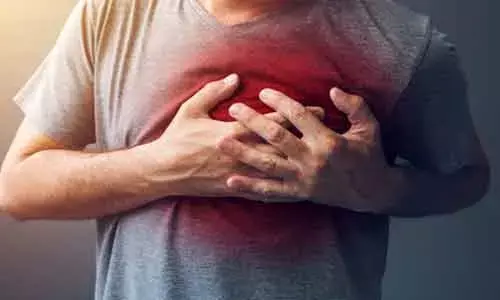- Home
- Medical news & Guidelines
- Anesthesiology
- Cardiology and CTVS
- Critical Care
- Dentistry
- Dermatology
- Diabetes and Endocrinology
- ENT
- Gastroenterology
- Medicine
- Nephrology
- Neurology
- Obstretics-Gynaecology
- Oncology
- Ophthalmology
- Orthopaedics
- Pediatrics-Neonatology
- Psychiatry
- Pulmonology
- Radiology
- Surgery
- Urology
- Laboratory Medicine
- Diet
- Nursing
- Paramedical
- Physiotherapy
- Health news
- Fact Check
- Bone Health Fact Check
- Brain Health Fact Check
- Cancer Related Fact Check
- Child Care Fact Check
- Dental and oral health fact check
- Diabetes and metabolic health fact check
- Diet and Nutrition Fact Check
- Eye and ENT Care Fact Check
- Fitness fact check
- Gut health fact check
- Heart health fact check
- Kidney health fact check
- Medical education fact check
- Men's health fact check
- Respiratory fact check
- Skin and hair care fact check
- Vaccine and Immunization fact check
- Women's health fact check
- AYUSH
- State News
- Andaman and Nicobar Islands
- Andhra Pradesh
- Arunachal Pradesh
- Assam
- Bihar
- Chandigarh
- Chattisgarh
- Dadra and Nagar Haveli
- Daman and Diu
- Delhi
- Goa
- Gujarat
- Haryana
- Himachal Pradesh
- Jammu & Kashmir
- Jharkhand
- Karnataka
- Kerala
- Ladakh
- Lakshadweep
- Madhya Pradesh
- Maharashtra
- Manipur
- Meghalaya
- Mizoram
- Nagaland
- Odisha
- Puducherry
- Punjab
- Rajasthan
- Sikkim
- Tamil Nadu
- Telangana
- Tripura
- Uttar Pradesh
- Uttrakhand
- West Bengal
- Medical Education
- Industry
A cost effective portable device could diagnose heart attacks in minutes

A novel sensor has been developed byr researchers from the University of Notre Dame and the University of Florida that could diagnose a heart attack in less than 30 minutes, according to a study published in Lab on a Chip.
Currently, it takes health care professionals hours to diagnose a heart attack. Initial results from an echocardiogram can quickly show indications of heart disease, but to confirm a patient is having a heart attack, a blood sample and analysis is required. Those results can take up to eight hours.
"The current methods used to diagnose a heart attack are not only time intensive, but they also have to be applied within a certain window of time to get accurate results," said Pinar Zorlutuna, the Sheehan Family Collegiate Professor of Engineering at Notre Dame and lead author of the paper. "Because our sensor targets a combination of miRNA, it can quickly diagnose more than just heart attacks without the timeline limitation."
By targeting three distinct types of microRNA or miRNA, the newly developed sensor can distinguish between an acute heart attack and a reperfusion — the restoration of blood flow, or reperfusion injury, and requires less blood than traditional diagnostic methods to do so. The ability to differentiate between someone with inadequate blood supply to an organ and someone with a reperfusion injury is an unmet, clinical need that this sensor addresses.
"The technology developed for this sensor showcases the advantage of using miRNA compared to protein-based biomarkers, the traditional diagnostic target," said Hsueh-Chia Chang, the Bayer Professor of Chemical and Biomolecular Engineering at Notre Dame and co-author of the paper. "Additionally, the portability and cost efficiency of this device demonstrates the potential for it to improve how heart attacks and related issues are diagnosed in clinical settings and in developing countries."
A patent application has been filed for the sensor and the researchers are working with Notre Dame's IDEA Center to potentially establish a startup company that would manufacture the device.
Bioengineers Chang and Zorlutuna are both affiliated with Notre Dame's Institute for Precision Health. Additional co-authors from Notre Dame are Stuart Ryan Blood, Cameron DeShetler, Bradley Ellis, Xiang Ren, George Ronan and Satyajyoti Senapati. Co-authors from the University of Florida are David Anderson, Eileen Handberg, Keith March and Carl Pepine. The study was funded by the National Institutes of Health National Heart, Lung, and Blood Institute.
https://pubs.rsc.org/en/content/articlelanding/2021/lc/d1lc00685a
Hina Zahid Joined Medical Dialogue in 2017 with a passion to work as a Reporter. She coordinates with various national and international journals and association and covers all the stories related to Medical guidelines, Medical Journals, rare medical surgeries as well as all the updates in the medical field. Email: editorial@medicaldialogues.in. Contact no. 011-43720751
Dr Kamal Kant Kohli-MBBS, DTCD- a chest specialist with more than 30 years of practice and a flair for writing clinical articles, Dr Kamal Kant Kohli joined Medical Dialogues as a Chief Editor of Medical News. Besides writing articles, as an editor, he proofreads and verifies all the medical content published on Medical Dialogues including those coming from journals, studies,medical conferences,guidelines etc. Email: drkohli@medicaldialogues.in. Contact no. 011-43720751


